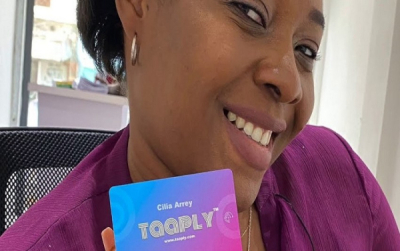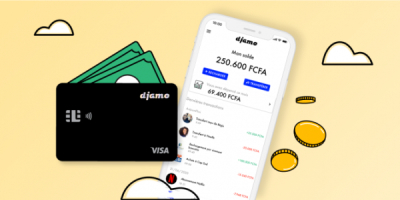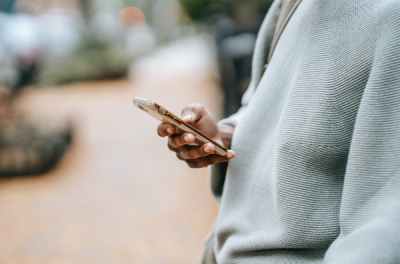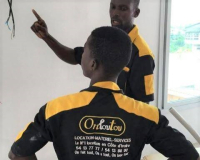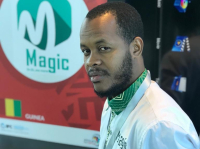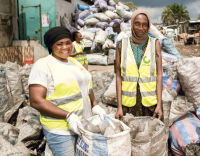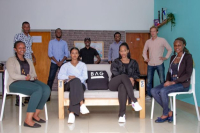
Solutions (581)
The coronavirus pandemic triggered a surge in remote work. Companies are now more open to hiring remote talents. Talenteum wants to facilitate the process by allowing access to a remote African talent pool.
Talenteum is a digital solution developed by Mauritian organizational development firm Talenteum Group. The solution allows companies to hire their workforce from a remote African talent pool. It also allows African professionals to join its talent pool to seek employment.
The platform boasts an active community of African professionals, from accountants to project managers. By subscribing to its monthly or yearly membership, companies can access that pool and launch recruitments. To launch those processes, companies have to fill out dedicated forms giving relevant details on the skills desired. Once those steps are completed, Talenteum takes over by posting relevant job ads, gathering resumes, and carrying out initial interviews.
In 2019, Talenteum made it to MyAfricanStartup.com's annual list of the 100 African startups worthy of investment. The following year, it was one of the finalists of the World Summit for Migration and Development, enabling its founders to present the solution during the Migration Challenge led by the International Organisation of Employers (IOE) and Seedstars.
Adoni Conrad Quenum
In Africa, rural areas are usually shunned by banks. Therefore, residents of those areas have to rely on alternative solutions. With Save, Rwandan startup Exuus wants to make those alternative solutions more efficient.
Save is a fintech solution developed by Rwandan startup Exuus. It allows individuals to “save collectively” for financial empowerment.
The solution was developed to facilitate an already existing process. “The lack of financial access for poor and vulnerable populations limits their access to a range of services and opportunities and, therefore, exacerbates their vulnerability to, in turn, end up in cycles of poverty. [...] To break this cycle, for decades now, low-income people both in urban and rural areas create savings groups. The savings circulates among members through different ways and return to members in credit or savings with interest giving them access to affordable capital to grow their small businesses and become financially resilient,” explained Exuus founder, Steve Shema.
Save makes the collective savings and loaning process smoother and more efficient. Thanks to its mobile app (available for Android and iOS devices), web platform, and USSD code, the solution empowers members of each saving group. After paying dues, members can apply for loans to start or expand their businesses.
The solution also helps members who belong to many saving groups to monitor their savings and pay their contributions without paying any transaction fee. In 2019, Exuus revealed that based on the feedback received for its fintech solution, it was planning to establish a presence in other East African countries. However, it said it was “tapping into a market of US$64 million in Rwanda and more than US$2 billion in annualized savings in East Africa.” At the time, the startup had already raised some US$575,000 for its operations.
Adoni Conrad Quenum
Corporate environmental responsibility has become a global trend in recent years. In its framework, businesses take actions to reduce their negative impacts on the environment. Taaply wants to assist in that process by introducing smart cards.
Taaply is a digital app developed by Cameroonian startup Taaply Inc. It helps read the contact information embedded in the QR codes of the smart cards issued by the Cameroonian startup.
By launching its smart cards, Taaply Inc (founded in 2020) aims to offer green solutions that will end paper use in the business information-sharing process. “Africa has a high rate of carbon emissions, with few methods on reducing its carbon footprint [...]. I believe Africa will benefit tremendously from digitizing business cards, thus reducing their carbon footprint and helping the environment,” says Taaply Inc. cofounder Lekel Asonganyi
Its business card reader is available for Android and iOS devices. It allows paying customers to update their business and personal information.
Taaply Inc. offers three types of cards. The first is the “Social Card”, which costs US$29.95. It is for “social enthusiasts such as students, bloggers, and non-business owners.” The second type of card is the “Pro Card (which costs US$39.95), dedicated to “ small business owners and entrepreneurs.” The last one is the “Corp Card” (US$64.95), which is the “perfect” solution for enterprises. It can be customized with “company logo, color, design and more.”
In 2021, Taaply Inc revealed that it had over 400 paying customers, with plans to expand into other African countries, namely Chad, Togo, Nigeria, and Kenya.
Adoni Conrad Quenum
In Sub-Saharan Africa, the majority of the population is unbanked or underbanked. To fill the gap left by mainstream financial institutions, startups are developing various tech solutions.
Djamo is a fintech solution developed by Ivorian startup DJAMO Holding Ltd. It issues visa cards to its users, facilitating their online transactions.
“Bank access is really difficult here [in Côte d’Ivoire]. We saw this difficulty as a huge opportunity. Our aim since inception has been to develop a mobile-first platform that could attract the masses. Our combined experience in the creation of consumer goods has been crucial in the launch of Djamo,” explained co-founder Hassan Bourgi.
By using its Android and iOS apps, Djamo clients can create an account and order a prepaid Visa card, which will be delivered within 48 hours. Users can load their Djamo Visa cards using mobile money or bank transfers. Then, they can easily make online purchases, benefiting from Djamo’s 3D secure technology. They can also easily block or unblock their cards (in the event of losing them or being stolen).
From 2019 to 2021, the fintech had close to 90,000 users with some 50,000 transactions processed monthly. In February 2021, it was selected for Y Combinator’s accelerator program, becoming the first Ivorian startup to join the program. Its participation in the winter program entitled it to US$125,000 seed funding. Overall, since its creation, Djamo Holding has secured over US$450,000 to support its growth.
Adoni Conrad Quenum
Currently, in Africa, the on-demand transportation market is mainly controlled by multinationals. Despite the competition, local tech entrepreneurs are moving to conquer it with more suited solutions.
Mapauto is a digital solution developed by a Segealese car rental agency. It allows its users to rent cars with drivers for errands in major Senegalese cities. The solution was launched, in 2020, by tech entrepreneur Mapenda Diop.
According to the latter, in Dakar, it was usually difficult to rent cars with drivers meeting international standards and being at the same time affordable. So, he assembled a team of young local talents to develop a digital solution allowing users to conveniently rent cars at competitive prices.
Its mobile app is available for Android and iOS devices. Once installed, it enables users to access all of the services offered by Mapauto. Upon registration, users can request rides from the airport to major neighborhoods in Dakar, or rent both cars and drivers for a whole day or a single trip, depending on the need.
Thanks to its integrated tracking system, Mapauto monitors its fleets in real-time. The tracking system also presents estimated waiting times to clients when they book a car. It also gives clients the identity of the driver coming to pick them up and the cost of the ride or errand.
Drivers drive Mapauto’s exclusive fleet made of prestigious cars like Peugeot 508 and Maserati Levante.
During an interview given in late 2021, when he was asked whether Mapauto is apprehensive of announced competition in the local car rental market, Mapenda Diop explained that far from being a threat, the arrival of new actors/competitors is a sign that the market has growth potentials. He explained that Mapauto would have to leverage technology to streamline its services. In the meantime, the startup expects to expand into the West African region first and then conquer the whole of Africa. By 2026, it hopes it would create over a thousand jobs.
Adoni Conrad Quenum
Instant messaging apps have demonstrated their worth over the past few years. However, the majority of the well-known apps are developed by Western actors. With Masolo, DR Congo can become one of the global countries with a major instant messaging app.
Masolo is an instant messenger app developed by Congolese startup Etidlabs. It allows users to send instant messages and media or make video/audio calls. In Lingala -one of the four most spoken languages in DR Congo, Masolo means “conversations.” It is some sort of pledge from the Congolese startup to facilitate and secure online chats.
The messenger app was initially developed for students at the University of Kinshasa. It aimed to democratize instant messaging within the university, which had no reliable internet connection. But, Etidlabs quickly realized that Masolo could be a great business in a country with more than 100 million inhabitants.
Apart from the features usually found with most of its competitors, the Congolese app has new acclaimed features and wants to add others. “We want to make Masolo an integrated platform that can offer several features (banking, e-commerce, gaming, news) and facilitate Congolese living conditions. We have added some Congolese and African touch to our stickers,” indicates Michel Matalatala, one of Etidlabs’ five co-founders.
The messaging app is available for Android and iOS devices. It has a security feature that prevents recipients from forwarding messages or taking screenshots of conversations. That feature, which is absent from the other instant messaging apps (except Snapchat maybe), demonstrates the Congolese startup’s commitment to offering new services and added security to its users.
Adoni Conrad Quenum
The Tech revolution is heating up worldwide with tech entrepreneurs developing solutions to make life easier for the population. In Africa particularly, startups are introducing new concepts.
Onloutou is a digital platform developed by an eponymous Ivorian startup specializing in property (electrical appliances notably) leasing. It allows users to rent various properties with no security deposits. The startup founded in 2019 operates in Côte d’Ivoire, Guinea, Burkina Faso, and Gabon.
Its digital platform has a mobile app, available for Android devices. Using the mobile app, users can register to rent the various properties available for lease on the platform. Those properties notably include graders, loaders, real estate properties, do-it-yourself items, household appliances, etc. It also gives the possibility to hire tilers, seamstresses, or interior designers.
To protect itself against lessees who can flee with its properties, Onloutou places geolocation devices on most of its leased properties. Thanks to those devices, it can remotely deactivate the equipment, rendering them useless for the lessees.
With Onloutou, property leasing is simple. It only requires an ID card from its clients to process leasing transactions. Currently, it claims over a thousand happy clients and some fifteen awards. In 2019, the startup took part in banking group BCP’s Open Innovation program, which is better known as Fintech Challenge. It emerged among the top six winners among 1200 applicants from several countries.
Adoni Conrad Quenum
In Africa, last-mile delivery services are gradually picking up. Although it may seem a novelty in some regions, startups active in the industry are developing solutions with hopes to attract a wider audience.
Magic is a mobile app launched, this year, by a Guinean logistics startup. It allows users to purchase products (food, drugs, etc) and get them delivered to their doorstep.
According to Abdoulaye Diallo (photo), CEO of Magic Guinea, the startup that developed the app was founded in 2017. Currently, it is operational in the capital city Conakry and its surroundings (Coyah and Dubrééka), Mamou, Labé, and Kamsar. It will soon start operations in Nzérékoré, Abdoulaye Diallo indicates.
The app is accessible for Android and iOS devices. Once registered, users can access its services like having food delivered, sending a check to a bank, sending someone to pay one’s bills, or making market and administrative errands. The app automatically sends quotes for the services chosen and once the order is validated, a courier takes care of the errand as quickly as possible.
Magic includes geolocation features that allow users to locate the nearest shops, restaurants, etc. The features also enable real-time monitoring of the order delivery process. Magic Guinea claims over a thousand downloads of its app. It also has notable Guinean companies among its subscribers and hopes to convince more people in a country where delivery services are novelties for the time being.
Adoni Conrad Quenum
Waste management is a challenge in several large African cities. As municipal services and even NGOs seem to be overwhelmed by the issue, startups are stepping in to develop innovative solutions.
Coliba is a digital platform developed by Ivorian waste management startup Coliba Africa. It allows the collection and recycling of plastic waste in Ivorian cities, notably in Abidjan where the startup has some fifteen waste containers.
Coliba Africa was founded in 2017, by Yaya Koné and Genesis Ehimegbe. According to Yaya Koné, it aimed to let households know how valuable their waste is. Indeed, for every waste deposited in Coliba’s containers, households receive points and bonuses that can be exchanged for vouchers or basic food or school kits depending on the neighborhood.
“We believe that plastic bottles must be considered as raw materials and informal waste management operators should be formalized thanks to the training we offer,” co-founder Yaya explains. He adds that Coliba’s services are accessible to every social class since they can be contacted via the internet or phone calls.
To reach a wider audience, the startup developed a mobile app (available for Android and iOS devices) but, it also has telephone numbers where users can reach out via calls or just by sending SMS. By using the mobile app, households can identify the nearest collection points, ask Coliba to come to pick up waste, convert their bonuses and points to rewards and remain informed about the latest waste recycling news on the African continent.
The startup has installed waste containers at filling stations, schools, and supermarkets. In Abidjan, it claims 135 containers, 16 operational stands where informal waste managers can sell their plastic waste and 64 direct jobs created.
It plans to cover the whole of Abidjan and enter other African cities by 2023. In 2020, it received an undisclosed amount of financial support from GreenTec Capital Partners to support its growth. The plastic waste it collects is used for the production of PET flakes for manufacturers. It produces over 1800 tons of PET flakes every year with hopes to reach 15,000 tons yearly by 2025.
Adoni Conrad Quenum
There is a huge gap between the academic and professional world. To equip young people with the practical experience needed to bridge that gap, a Rwandan startup developed a virtual internship platform connecting students and companies.
BAG Innovation is a digital platform developed by a Rwanda startup founded in 2017. It allows students to get practical experience via virtual internships in large firms.
“BAG seeks to disrupt the traditional approach to how individuals acquire experience at school and build up the next generation of problem solvers. This is why our name is "BAG - Building A Generation," the startup indicates.
To access its services, students have to create an account by providing their personal information. Then, they detail their academic career and areas of interest. Those steps help BAG Innovation present the internships most suited for every profile.
Thanks to augmented reality and machine learning, BAG tests students’ skills by confronting them with real-life situations in one of its partner companies. It also uses a mix of artificial intelligence and gamification to enable students to “complement theoretical learning with practical experience.”
The start-up claims to have reached more than 8,000 students in Rwanda, including 600 who received job offers. It has partnered with about 15 universities and more than 115 small and medium-sized enterprises.
Adoni Conrad Quenum
More...
The number of solutions connecting artisans and individuals is growing in Africa. With those solutions, entrepreneurs are trying to facilitate their compatriots’ living conditions by using tech solutions.
Iya is a Togolese digital platform that networks artisans with individuals who need blue-collar workers. It also includes a specialized e-store. The digital solution was launched in 2021 but, it was being developed since 2020.
“Iya.com is a company that provides artisans for all kinds of repair or renovation works. It aims to offer individuals, companies, and craftsmen the easiest way to identify and carry out all kinds of work,” the startup behind it explains.
The platform has a mobile app, available for Android devices only. Users who want to hire artisans can open a “client account” and select among the artisans available. As for blue-collar workers, they can create a free “worker” account and apply for the offers available in the nearest neighborhood.
Iya lists more than two hundred artisans working in several sectors. It also has an online store where fashion accessories, furniture, paintings, and sculptures are sold. The objective is to promote the artisans present on the platform.
Adoni Conrad Quenum
Healthtech solutions are sprouting to help the African population easily access healthcare. In Cameroon, an entrepreneur is focusing on preventive care.
Healthlane is a digital platform developed by a Cameroonian startup founded in 2020. It allows users access to quality and affordable healthcare in Cameroon and Nigeria.
The platform has a mobile app (available for Android and iOS devices), through which users can book preventive care. To keep users healthy, it allows dozens of preventive checks.
Healthlane has a range of premium health packs allowing access to its services. Its packs cost between XAF50,000 and XAF250,000. For instance, the XAF50,000 pack gives access to 48 preventive checkups against over 100 preventive checks for the XAF250,000 pack. The startup aims to help users “detect diseases before they strike.” So, even people with health insurance plans can buy Healthlane’s packs.
The startup claims over 500 preventive checkups performed, over 10,000 curative care given and 10,000 vaccines administered. In 2020, it participated in the winter cohort of Californian accelerator Y Combinator. The same year, it raised US$2.4 million to boost its development. It even announced its expansion to the Kenyan and Ivorian markets in the next few months.
Adoni Conrad Quenum
In Africa, most workers have no access to social security coverage since they work in the informal sector. In Tunisia, an entrepreneur has decided to help rural women access that service.
Ahmini is a digital platform developed by a Tunisian startup founded in 2019. It facilitates rural women’s integration into the social security system. The startup, which developed the platform, is the result of its founder, Meher Khelifi’s personal experience.
According to Meher, in rural regions, women usually work on their husbands’ farms without leaves or rest days. Their difficult working conditions damage their health but, they are usually unable to access quality healthcare due to limited financial resources, he explains. “I don't want anybody to live my experience: see someone very close to me die and not be able to do anything,” he said.
To reach a larger number of rural women, Ahmini and hundreds of trained volunteers met with the women and explained the advantages of subscribing to social security coverage. "There were no laws providing social or health coverage to rural women. Also, municipalities were not that much supportive, but I managed to prompt an amendment of the laws and the introduction of new ones covering rural women’s insurance,” he added.
Ahmini links social security numbers to the insured women’s SIM cards, facilitating access to affordable insurance. It also offers the possibility to sponsor women in various regions in Tunisia. Currently, it claims over 15,000 women registered, including 8,360 that were sponsored. It plans to expand throughout the Arab world, starting with Algeria and Lebanon.
Adoni Conrad Quenum
The coronavirus pandemic prompted the development of numerous distance-learning platforms in Africa. In Morocco, an edtech startup has decided to facilitate the process.
KoolSkools is a digital edtech platform deployed by a Moroccan eponymous startup in 2020. It enables schools to digitalize their course materials, create a content bank and deliver live classes online. It aims to help improve the academic performance of primary and secondary school students.
According to its founders, KoolSkools “helps unleash students’ creativity, lets them experience another type of education, facilitates interactions and knowledge transfer, connect schools, teachers, students, and parents while offering quality educational content.”
The platform has a mobile app (available for Android and iOS devices) that allows parents, students, teachers, and academic institutions to register an account with KoolSkools. Using the app, students can attend classes and send practical assessments to teachers. As for parents, they can monitor their children’s performance and class attendance as well as access course transcripts.
KoolSkools also aims to be a digital management tool for daily school operations such as student records, payment management, and communication with parents.
The edtech is present in several major Moroccan cities and claims to work with about 30 schools, 20,000 students, and nearly 700 teachers. Its ambition is to reach 100,000 students in the next two or three years and cover the whole of Morocco. Recently, it secured US$290,000 support from the institutional fund Maroc Numeric Fund.
Adoni Conrad Quenum




